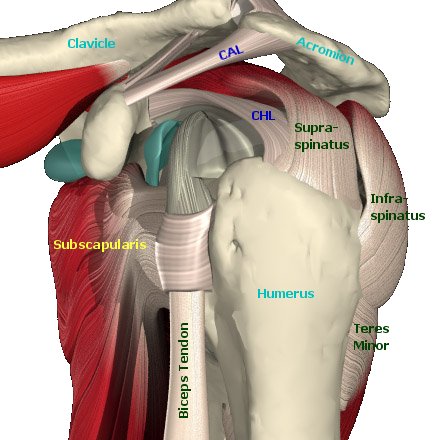ROTATOR CUFF INJURY
The rotator cuff is a group of four muscles their tendons which support and allow your shoulder to move in the various planes of motion. The four major muscles (subscapularis, supraspinatus, infraspinatus and teres minor) and their tendons connect your upper arm bone (humerus) with your shoulder blade. They also help hold the ball of your upper arm bone firmly in your shoulder socket, as if holding a golf ball on a tee. The combination results in the greatest range of motion of any joint in your body.
Rotator cuff injuries are fairly common. Causes of the injury may include falling, lifting and repetitive arm activities, especially those done overhead. These activities may include throwing a baseball, reaching up to work on a car on a rack or placing items on shelves above your head. The injury is also common among people whose jobs or hobbies include heavy demands on their shoulders, such as athletes, archers and people in the construction trades. Poor posture, especially as related to your shoulders hunched forward, also can contribute to rotator cuff injury. As you get older, your risk of a rotator cuff injury increases.
Most of the time, treatment involves self-care measures or exercise therapy. Other treatments include steroid injections and surgery.
Signs and symptoms
- Pain and tenderness in your shoulder, especially when reaching overhead, reaching behind your back, lifting, pulling or sleeping on the affected side.
- Shoulder weakness.
- Loss of shoulder range of motion.
- Inclination to keep your shoulder inactive.
The most common symptom is pain. You may experience it when you reach up to comb your hair, bend your arm back to put on a jacket or carry something heavy. Lying or sleeping on the affected shoulder also can be painful. If you have a severe injury, such as a large tear, you may experience continuous pain and muscle weakness.
Causes
A rotator cuff injury involves any type of irritation or damage to your rotator cuff muscles or tendons, including:
- Tendinitis. Tendons in your rotator cuff can become inflamed due to overuse or overload, especially in athletes who perform a lot of overhead activities, such as tennis or racquetball players. In some people, the space where the rotator cuff resides can be narrowed due to the shape of different shoulder bones, including the outside end of the collarbone or shoulder blade.
- Bursitis. The fluid-filled sac (bursa) between your shoulder joint and rotator cuff tendons can become irritated and inflamed.
- Strain or tear. Left untreated, tendinitis can weaken a tendon and lead to chronic tendon degeneration or to a tendon tear. Stress from overuse also can cause a shoulder tendon or muscle to tear.
Common causes of rotator cuff injuries include:
- Normal wear and tear. Increasingly after age 40, normal wear and tear on your rotator cuff can cause a breakdown of fibrous protein (collagen) in the cuff’s tendons and muscles. This makes them more prone to degeneration and injury. With age, you may also develop calcium deposits within the cuff or arthritic bone spurs that can pinch or irritate your rotator cuff.
- Poor posture. When you slouch your neck and shoulders forward, the space where the rotator cuff muscles reside can become smaller. This can allow a muscle or tendon to become pinched under your shoulder bones, including your collarbone, especially during overhead activities, such as throwing.
- Falling. Using your arm to break a fall or falling on your arm can bruise or tear a rotator cuff tendon or muscle.
- Lifting or pulling. Lifting an object that’s too heavy, or doing so improperly — especially overhead — can strain or tear your tendons or muscles. Likewise, pulling something, such as an archery bow of too heavy poundage, may cause an injury.
- Repetitive stress. Repetitive overhead movement of your arms can stress your rotator cuff muscles and tendons, causing inflammation and eventually tearing. This occurs often in athletes, especially baseball pitchers and tennis players. It’s also common among people in the building trades, such as painters and carpenters.
Contact Us
13710 Olive Boulevard (Primary Office)
Chesterfield, MO 63017
Telephone: 314-469-PAIN (7246)
Fax: 314-469-7251
Exchange: 314-441-6965 (for after-hour Emergencies Only)
Hours:
Monday thru Friday
8:30 AM – 4:30 PM


